Thanks Suzy, this nails it nicely in an understandable way.Comparison of key features of SSD, BDD and proposed BSS
PNG version: https://dxrevisionwatch.files.wordpress.com/2019/09/comp-ssd-bdd-bss-v2.png
PDF version: https://dxrevisionwatch.files.wordpress.com/2019/09/comparison-of-ssd-bdd-and-bss-v3.pdf

Adapted from Table: Comparison of SSD, BDD, BDS, BSS in classification systems, Version 1 | July 2018, Chapman & Dimmock
https://dxrevisionwatch.files.wordp...-bdd-bds-bss-in-classification-systems-v1.pdf
1 T P Lam, D P Goldberg, A C Dowell, S Fortes, J K Mbatia, F A Minhas, M S Klinkman. Proposed new diagnoses of anxious depression and bodily stress syndrome in ICD-11-PHC: an international focus group study, Family Practice, Volume 30, Issue 1, February 2013, Pages 76–87 https://doi.org/10.1093/fampra/cms037
Suzy Chapman, Dx Revision Watch, September 2019
- Home
- Forums
- Guidelines, reviews and disease coding
- ME/CFS related guidelines, reviews, disease coding
- Disease coding
You are using an out of date browser. It may not display this or other websites correctly.
You should upgrade or use an alternative browser.
You should upgrade or use an alternative browser.
Updates on status of ICD-11 and changes to other classification and terminology systems
- Thread starter Dx Revision Watch
- Start date
Dx Revision Watch
Senior Member (Voting Rights)
Thanks Suzy, this nails it nicely in an understandable way.
You're welcome Amw66, and now I must step back.
However, I will return to this thread to update when WHO has released the Chapter 06 specialty publication:
"Clinical Descriptions and Diagnostic Guidelines (CDDG) for ICD‐11 Mental, Behavioural and Neurodevelopmental Disorders"
and the 27 mental disorder:
"ICD-11 Primary Health Care (PHC) Guidelines for Diagnosis and Management of Mental Disorders (ICD-11 PHC)"
or if there are any interim updates on the development of either of these publications that forum members should be apprised of.
Also any updates on the development of the revision of ICPC-2* for ICPC-3
*International Classification of Primary Care, Second edition (ICPC-2):
https://www.who.int/classifications/icd/adaptations/icpc2/en/
"WHO has accepted ICPC-2 within the WHO FIC mainly as a reason for encounter classification, and users may use it as a classification for primary care or general practice wherever applicable.
ICPC-2 classifies patient data and clinical activity in the domains of General/Family Practice and primary care, taking into account the frequency distribution of problems seen in these domains. It allows classification of the patient’s reason for encounter (RFE), the problems/diagnosis managed, interventions, and the ordering of these data in an episode of care structure..."
(ICPC-2 is available in 34 countries, used in Primary Care in 27 countries and is mandatory for use in 6 EU countries.)
Esther12
Senior Member (Voting Rights)
Thanks for the discussion on this.
Isn't that just saying that, in this reality, BDD is likely to cause serious problems for ME/CFS patients but in an alternative time-line they might not? UK medicine is going to go on blathering on about the need to take a sophisticated biopsychosocial approach to ME/CFS that recognises that all illness are affected by a range of factors, and disputes over 'biological vs psychological' classification are going to be used to distract from the real problems with the biopsychosocial approach, which BDD seems likely to worsen.
What I’m saying is that while BDS criteria specifically target ME, BDD criteria do not. So if the UK recognizes ME as a biological disease - and I have hopes that this change is underway - that new approach will not conflict with BDD.
The BDD construct does not force any doctor to include ME. They can choose to, and many certainly will, so it would be best to have an exclusion for ME. But the construct does not specifically target ME. BDS criteria were designed to ensure that ME patients would be “captured” - and they are very successful at that goal. As a result, if the U.K. decided that ME is a biological disease and BDS criteria had been recommended, those would need to be changed or removed or disclaimed.
Isn't that just saying that, in this reality, BDD is likely to cause serious problems for ME/CFS patients but in an alternative time-line they might not? UK medicine is going to go on blathering on about the need to take a sophisticated biopsychosocial approach to ME/CFS that recognises that all illness are affected by a range of factors, and disputes over 'biological vs psychological' classification are going to be used to distract from the real problems with the biopsychosocial approach, which BDD seems likely to worsen.
Dx Revision Watch
Senior Member (Voting Rights)
One last point, as followers of this thread will be aware, SNOMED CT UK Edition is now the mandatory terminology system for use in NHS Primary Care, having replaced the retired Read Code (CTV3) terminology system.
SNOMED CT is planned to be rolled out across all NHS secondary care settings from 2020.
A SNOMED CT SCTID Concept code for ICD-11's Bodily distress disorder (BDD) was added to the SNOMED CT International Edition's July 2017 release and subsequently incorporated into all the national editions. The three ICD-11 severity specifiers (Mild; Moderate; Severe) were added, following a submission, to the July 2018 release and are assigned unique SCTID codes.
See:
https://dxrevisionwatch.files.wordp...snomed-ct-and-bodily-distress-disorder-v2.pdf
Statement on SNOMED CT and Bodily distress disorder August 2018
Extract from statement:
-------------------------
Within the SNOMED CT International Edition and the various national editions there is an SCTID Concept code for:
161904006 |Unexplained symptoms continue (finding)|
and:
702537003 |Medically unexplained symptom (finding)|
Within the UK Edition, there is also an additional code for:
887761000000101 |Medically unexplained symptoms (finding)|
which is specific to the SNOMED CT UK Edition.
SNOMED CT is planned to be rolled out across all NHS secondary care settings from 2020.
A SNOMED CT SCTID Concept code for ICD-11's Bodily distress disorder (BDD) was added to the SNOMED CT International Edition's July 2017 release and subsequently incorporated into all the national editions. The three ICD-11 severity specifiers (Mild; Moderate; Severe) were added, following a submission, to the July 2018 release and are assigned unique SCTID codes.
See:
https://dxrevisionwatch.files.wordp...snomed-ct-and-bodily-distress-disorder-v2.pdf
Statement on SNOMED CT and Bodily distress disorder August 2018
Extract from statement:
In October 2017, SNOMED International’s Head of Terminology clarified that:
● The SNOMED CT Concept: Bodily distress disorder had been added by the team working on the SNOMED CT and ICD-11 MMS Mapping Project as an exact match for the ICD-11 term, Bodily distress disorder.
● The term "Bodily distress syndrome" does not currently exist within SNOMED CT.
● The SNOMED CT Concept: Bodily distress disorder had been added by the team working on the SNOMED CT and ICD-11 MMS Mapping Project as an exact match for the ICD-11 term, Bodily distress disorder.
● The term "Bodily distress syndrome" does not currently exist within SNOMED CT.
-------------------------
Within the SNOMED CT International Edition and the various national editions there is an SCTID Concept code for:
161904006 |Unexplained symptoms continue (finding)|
and:
702537003 |Medically unexplained symptom (finding)|
Within the UK Edition, there is also an additional code for:
887761000000101 |Medically unexplained symptoms (finding)|
which is specific to the SNOMED CT UK Edition.
Last edited:
Dx Revision Watch
Senior Member (Voting Rights)
Full transcripts of the two day NCVHS ICD-11 Expert Roundtable meeting, which took place in August, have recently been added to the Expert Roundtable meeting page:
The U.S. National Committee on Vital and Health Statistics (NCVHS) serves as the statutory public advisory body to the Secretary of Health and Human Services for health data, statistics, privacy, and national health information policy and the Health Insurance Portability and Accountability Act (HIPAA).
National Committee on Vital and Health Statistics
Subcommittee on Standards
ICD-11 Expert Roundtable Meeting August 6-7, 2019
HHS Headquarters, Hubert Humphrey Building
200 Independence Avenue, SW, Room 705-A
Washington, DC 2020
https://ncvhs.hhs.gov/meetings/subc...-icd-11-evaluation-expert-roundtable-meeting/
Agenda: https://ncvhs.hhs.gov/wp-content/up...ubcommittee-ICD-11-Expert-Panel-Rountable.pdf
Day 1: Mp3 Recording - Subcommittee on Standards – ICD-11 Expert Roundtable Meeting August 6, 2019
https://ncvhs.hhs.gov/wp-content/uploads/2019/08/2019 August 6-7 NCVHS SC Meeting Audio - Day 1.mp3
Day 2: Mp3 Recording - Subcommittee on Standards – ICD-11 Expert Roundtable Meeting August 7, 2019
https://ncvhs.hhs.gov/wp-content/uploads/2019/08/2019 August 6-7 NCVHS SC Meeting Audio - Day 2.mp3
(PDFs are also attached to this post)
Transcript Day 1 (August 6):
[165pp]
https://ncvhs.hhs.gov/wp-content/up...e-ICD-11-Expert-Panel-Roundtable-August-6.pdf
Transcript Day 2 (August 7):
[129pp]
https://ncvhs.hhs.gov/wp-content/up...e-ICD-11-Expert-Panel-Roundtable-August-7.pdf
These transcripts of the August two day ICD-11 Roundtable meeting are 165 and 129 pages long and the files have only recently been posted on the NCVHS site.
I have not had time to review these yet, but they are essential reading for industry and public stakeholders in the U.S.'s potential adoption of ICD-11 or NCHS/CDC's potential development of a clinical modification of ICD-11.
The U.S. National Committee on Vital and Health Statistics (NCVHS) serves as the statutory public advisory body to the Secretary of Health and Human Services for health data, statistics, privacy, and national health information policy and the Health Insurance Portability and Accountability Act (HIPAA).
National Committee on Vital and Health Statistics
Subcommittee on Standards
ICD-11 Expert Roundtable Meeting August 6-7, 2019
HHS Headquarters, Hubert Humphrey Building
200 Independence Avenue, SW, Room 705-A
Washington, DC 2020
https://ncvhs.hhs.gov/meetings/subc...-icd-11-evaluation-expert-roundtable-meeting/
Agenda: https://ncvhs.hhs.gov/wp-content/up...ubcommittee-ICD-11-Expert-Panel-Rountable.pdf
Day 1: Mp3 Recording - Subcommittee on Standards – ICD-11 Expert Roundtable Meeting August 6, 2019
https://ncvhs.hhs.gov/wp-content/uploads/2019/08/2019 August 6-7 NCVHS SC Meeting Audio - Day 1.mp3
Day 2: Mp3 Recording - Subcommittee on Standards – ICD-11 Expert Roundtable Meeting August 7, 2019
https://ncvhs.hhs.gov/wp-content/uploads/2019/08/2019 August 6-7 NCVHS SC Meeting Audio - Day 2.mp3
(PDFs are also attached to this post)
Transcript Day 1 (August 6):
[165pp]
https://ncvhs.hhs.gov/wp-content/up...e-ICD-11-Expert-Panel-Roundtable-August-6.pdf
Transcript Day 2 (August 7):
[129pp]
https://ncvhs.hhs.gov/wp-content/up...e-ICD-11-Expert-Panel-Roundtable-August-7.pdf
These transcripts of the August two day ICD-11 Roundtable meeting are 165 and 129 pages long and the files have only recently been posted on the NCVHS site.
I have not had time to review these yet, but they are essential reading for industry and public stakeholders in the U.S.'s potential adoption of ICD-11 or NCHS/CDC's potential development of a clinical modification of ICD-11.
Attachments
Last edited:
Dx Revision Watch
Senior Member (Voting Rights)
The U.S. National Committee on Vital and Health Statistics (NCVHS) serves as the statutory public advisory body to the Secretary of Health and Human Services for health data, statistics, privacy, and national health information policy and the Health Insurance Portability and Accountability Act (HIPAA).
AHIMA = American Health Information Management Association
Summary of August 6-7, 2019 NCVHS Subcommittee on Standards ICD-11 Expert Roundtable meeting by AHIMA's Sue Bowman, MJ, RHIA, CCS, FAHIMA who attended the meeting:
https://journal.ahima.org/2019/08/28/ahima-participates-in-icd-11-expert-roundtable/
AHIMA Participates in ICD-11 Expert Roundtable | Journal of AHIMA | Aug 28, 2019 | Sue Bowman, MJ, RHIA, CCS, FAHIMA
-------------------------------------------------------------------------------------------------------
The U.S. adopted the international version of ICD-10 for reporting mortality statistics in 1999. The much expanded clinical modification of ICD-10, ICD-10-CM, which was finally implemented in October 2015, is used for morbidity.
WHO has yet to publish policies and licensing arrangements for the potential development of national (clinical) modifications of ICD-11 but has indicated that they would like to limit the development of national modifications.
From transcript of August 6-7th, 2019 NCVHS ICD-11 Roundtable meeting:
Dr Bill Stead: "...as a member of the World Health Organization, the US is already committed to implementing ICD-11 for mortality. That is a given. The only thing that we can try to influence is the timeline and method of implementation. The other evaluation issues all surround morbidity. Which, because there are any number of questions; does there need to be an ICD-11 CM. How do we evaluate the fitness of ICD-11 for morbidity as it stands?"
Dr Robert Anderson: "I figure probably six years [for adoption of ICD-11 for mortality use]. I do not want to say six years from now because I do not want to be on the hook if it takes longer than that. But I would say that I do not think that we could implement [ICD-11 for mortality use in the U.S.] any earlier than about six years from now."
Donna Pickett: "...we are still actively updating ICD-10 CM, we are getting new proposals from subject matter experts, clinical groups, etc, and checking to see if that concept is represented in [ICD-11] . . . We are finding some gaps there too. That does not mean they cannot be brought to WHO for an update to ICD-11, but whether their update cycle will really work with the needs of the US and its public health needs is another issue that would need to be worked out."
Rich Landen: "For implementation in this country, there is a pathway that we have to follow that starts with NCVHS making a recommendation to the secretary to adopt or not adopt ICD-11 with or without a clinical modification as a HIPAA-mandated code set. HHS then reacts to that. There would be a proposed rule, public comment, final rule, and included in the final rule would be specify the process for how long of a lead time there is between the issuance of the final rule and by which time industry would have to implement. That is the pathway."
Linda Kloss: "Just a reminder that we did send a letter to the secretary suggesting that adoption of ICD-11 need not be put through the regulatory channels because it should be viewed as a version update. We do not know whether any action will be taken on that recommendation. I think when we think about pathways, there is the regulatory pathway and then there is the idealized pathway, if you will. If this were something that could go forward after all the necessary research has been completed, what is the right timing, assuming that we are good by World Health Organization perspectives to begin after 2022? But just thinking this out with other things going on in our environment. One path is the regulatory and the other is let's say our recommendation gets adopted and the requirement that this be a regulatory change gets adopted."
Nelly Leon-Chisen: "Would it be feasible to implement by 2025 if we do the implementation without a clinical modification and the need for regulations? Or if we do need regulations in a clinical modification, would 2027 be feasible? And just so you do not think that we picked 2025 randomly out of a hat is that that would be ten years post-ICD-10-CM/PCS and we really do not think that it could be done earlier.
-----------------------
The NCVHS Subcommittee on Standards ICD-11 Expert Roundtable group is in the process of drafting a letter, report and attachments to be sent to the Secretary, Department of Health and Human Services (HHS) outlining key research questions identified during the August 2019 Expert Roundtable two day meeting. I will update the thread when the proposed letter and enclosures has been released and with any progress report from the forthcoming November 13-14th, 2019 NCVHS Full Committee Meeting for which the Agenda is not yet available.
------------------------
Edited to insert slides:
NCVHS Update, Rich Landen, Member, National Committee on Vital and Health Statistics, Co‐chair, Standards Subcommittee, August 2019:
https://s3.amazonaws.com/amo_hub_content/Association361/files/NCVHS Update - Landen.pdf
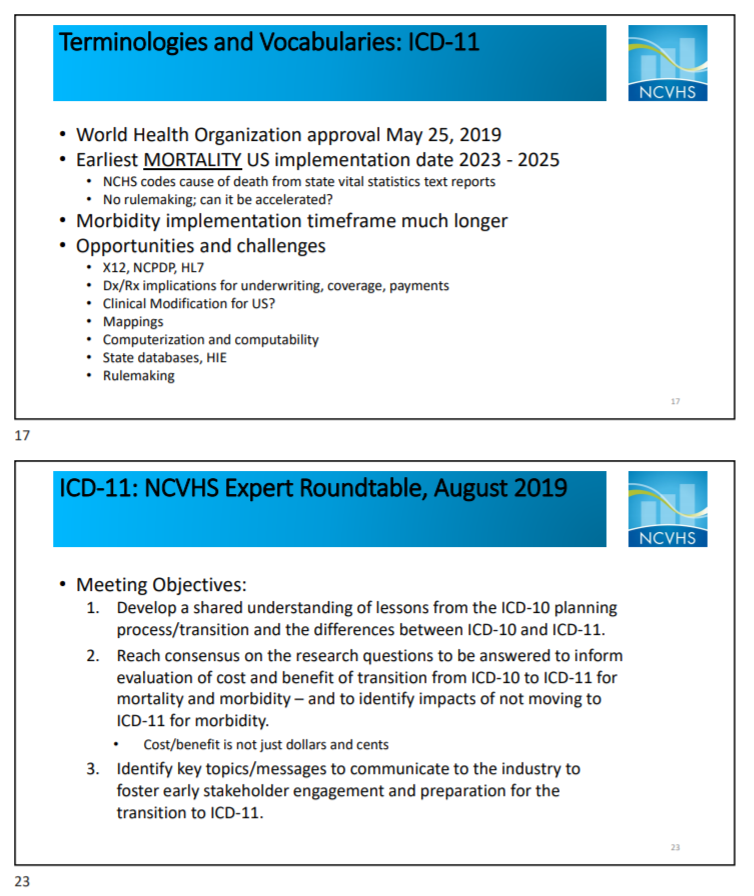
[Edited to insert Update]
Update:
A summary of the August 6-7, 2019 ICD-11 Roundtable meeting has now been posted by NCVHS:
International Classification of Diseases,
Eleventh Revision (ICD-11) Expert Roundtable
Publication Date: October 10, 2019 PDF: Preliminary Meeting Summary
Key points for planned Letter to Secretary, HHS:
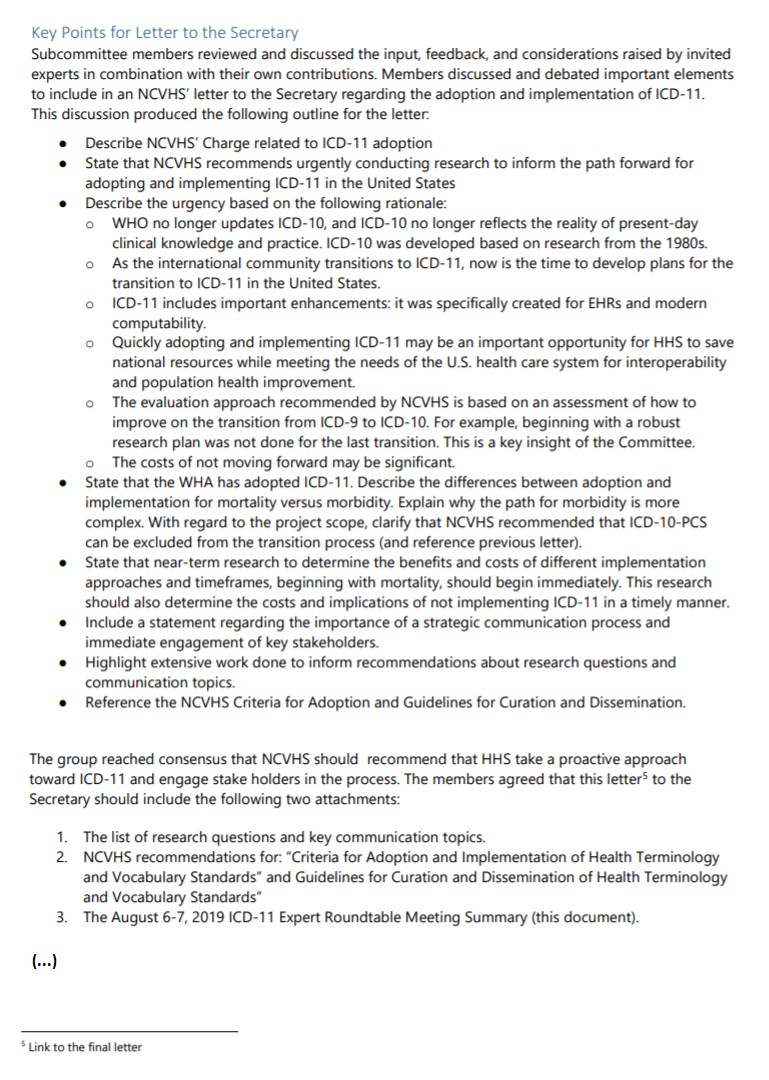
Appendix E: Final Research Questions [Will be inserted by Expert Roundtable group when final]
Appendix F: ICD-11 Communications Plan [Will be inserted by Expert Roundtable group when final]
AHIMA = American Health Information Management Association
Summary of August 6-7, 2019 NCVHS Subcommittee on Standards ICD-11 Expert Roundtable meeting by AHIMA's Sue Bowman, MJ, RHIA, CCS, FAHIMA who attended the meeting:
https://journal.ahima.org/2019/08/28/ahima-participates-in-icd-11-expert-roundtable/
AHIMA Participates in ICD-11 Expert Roundtable | Journal of AHIMA | Aug 28, 2019 | Sue Bowman, MJ, RHIA, CCS, FAHIMA
-------------------------------------------------------------------------------------------------------
The U.S. adopted the international version of ICD-10 for reporting mortality statistics in 1999. The much expanded clinical modification of ICD-10, ICD-10-CM, which was finally implemented in October 2015, is used for morbidity.
WHO has yet to publish policies and licensing arrangements for the potential development of national (clinical) modifications of ICD-11 but has indicated that they would like to limit the development of national modifications.
From transcript of August 6-7th, 2019 NCVHS ICD-11 Roundtable meeting:
Dr Bill Stead: "...as a member of the World Health Organization, the US is already committed to implementing ICD-11 for mortality. That is a given. The only thing that we can try to influence is the timeline and method of implementation. The other evaluation issues all surround morbidity. Which, because there are any number of questions; does there need to be an ICD-11 CM. How do we evaluate the fitness of ICD-11 for morbidity as it stands?"
Dr Robert Anderson: "I figure probably six years [for adoption of ICD-11 for mortality use]. I do not want to say six years from now because I do not want to be on the hook if it takes longer than that. But I would say that I do not think that we could implement [ICD-11 for mortality use in the U.S.] any earlier than about six years from now."
Donna Pickett: "...we are still actively updating ICD-10 CM, we are getting new proposals from subject matter experts, clinical groups, etc, and checking to see if that concept is represented in [ICD-11] . . . We are finding some gaps there too. That does not mean they cannot be brought to WHO for an update to ICD-11, but whether their update cycle will really work with the needs of the US and its public health needs is another issue that would need to be worked out."
Rich Landen: "For implementation in this country, there is a pathway that we have to follow that starts with NCVHS making a recommendation to the secretary to adopt or not adopt ICD-11 with or without a clinical modification as a HIPAA-mandated code set. HHS then reacts to that. There would be a proposed rule, public comment, final rule, and included in the final rule would be specify the process for how long of a lead time there is between the issuance of the final rule and by which time industry would have to implement. That is the pathway."
Linda Kloss: "Just a reminder that we did send a letter to the secretary suggesting that adoption of ICD-11 need not be put through the regulatory channels because it should be viewed as a version update. We do not know whether any action will be taken on that recommendation. I think when we think about pathways, there is the regulatory pathway and then there is the idealized pathway, if you will. If this were something that could go forward after all the necessary research has been completed, what is the right timing, assuming that we are good by World Health Organization perspectives to begin after 2022? But just thinking this out with other things going on in our environment. One path is the regulatory and the other is let's say our recommendation gets adopted and the requirement that this be a regulatory change gets adopted."
Nelly Leon-Chisen: "Would it be feasible to implement by 2025 if we do the implementation without a clinical modification and the need for regulations? Or if we do need regulations in a clinical modification, would 2027 be feasible? And just so you do not think that we picked 2025 randomly out of a hat is that that would be ten years post-ICD-10-CM/PCS and we really do not think that it could be done earlier.
-----------------------
The NCVHS Subcommittee on Standards ICD-11 Expert Roundtable group is in the process of drafting a letter, report and attachments to be sent to the Secretary, Department of Health and Human Services (HHS) outlining key research questions identified during the August 2019 Expert Roundtable two day meeting. I will update the thread when the proposed letter and enclosures has been released and with any progress report from the forthcoming November 13-14th, 2019 NCVHS Full Committee Meeting for which the Agenda is not yet available.
------------------------
Edited to insert slides:
NCVHS Update, Rich Landen, Member, National Committee on Vital and Health Statistics, Co‐chair, Standards Subcommittee, August 2019:
https://s3.amazonaws.com/amo_hub_content/Association361/files/NCVHS Update - Landen.pdf

[Edited to insert Update]
Update:
A summary of the August 6-7, 2019 ICD-11 Roundtable meeting has now been posted by NCVHS:
International Classification of Diseases,
Eleventh Revision (ICD-11) Expert Roundtable
Publication Date: October 10, 2019 PDF: Preliminary Meeting Summary
Key points for planned Letter to Secretary, HHS:

Appendix E: Final Research Questions [Will be inserted by Expert Roundtable group when final]
Appendix F: ICD-11 Communications Plan [Will be inserted by Expert Roundtable group when final]
Last edited:
Dx Revision Watch
Senior Member (Voting Rights)
Extract from Dx Revision Watch post #354:
World Health Assembly adopts ICD-11: When will member states start using the new edition?
https://dxrevisionwatch.com/2019/06/17/world-health-assembly-adopts-icd-11-when-will-member-states-start-using-the-new-edition/
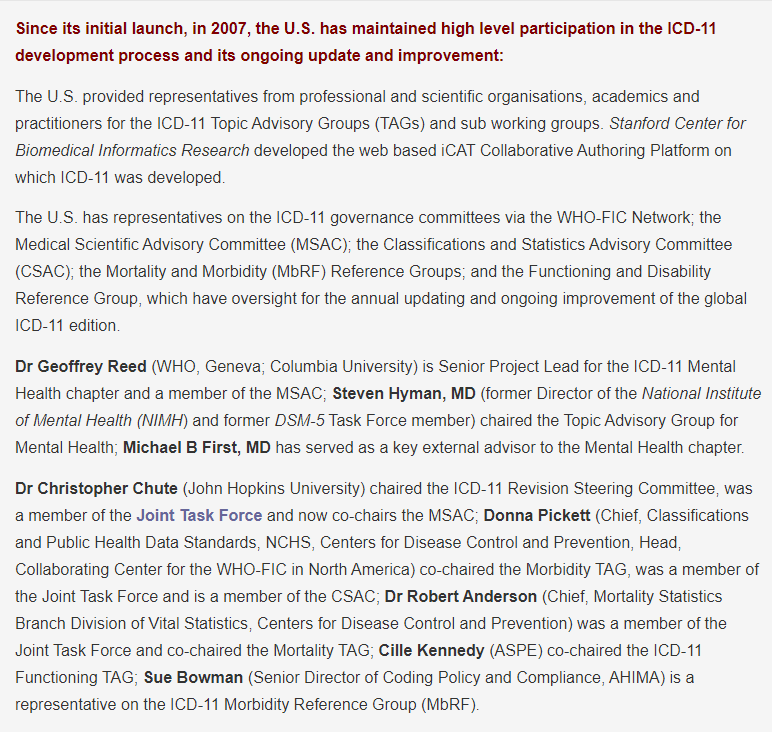
Harold Pincus, MD co-chaired the ICD-11 Quality and Patient Safety Topic Advisory Group.
World Health Assembly adopts ICD-11: When will member states start using the new edition?
https://dxrevisionwatch.com/2019/06/17/world-health-assembly-adopts-icd-11-when-will-member-states-start-using-the-new-edition/

Harold Pincus, MD co-chaired the ICD-11 Quality and Patient Safety Topic Advisory Group.
Last edited:
Dx Revision Watch
Senior Member (Voting Rights)
This is an important alert about a recent development with SNOMED CT terminology system.
As some of you will be aware, I am now retired from active advocacy work around coding, classification and terminology systems.
I am very concerned that no UK or international group or organization appears to have been monitoring SNOMED CT for changes to the terminology system for Concept SCTID: 52702003 Chronic fatigue syndrome (disorder) since the successful submission, in February 2018, for the addition of Parent SCTID: 118940003 Disorder of nervous system (disorder). This approved change had been implemented for the July 2018 release and subsequently incorporated into the various national editions.
(See my August 2018 statement: Statement on SNOMED CT and Chronic fatigue syndrome for the background to this submission.)
Addition of a further Parent for SCTID: 52702003 Chronic fatigue syndrome (disorder):
I have established, today, that there has been a recent change for SCTID: 52702003 Chronic fatigue syndrome (disorder) and the terms listed under Synonyms to SCTID: 52702003, for which the International Edition includes:
https://browser.ihtsdotools.org/?pe...edition=MAIN/2019-07-31&release=&languages=en
According to the Release Notes for the International Edition's July 2019 release, SNOMED terminology managers had completed a number of content reviews, including: Review hierarchy 84229001|Fatigue (finding) and subtypes.
Below is the reference to this hierarchy review, extracted from the Release Notes:
SNOMED CT July 2019 International Edition - SNOMED International Release notes
https://confluence.ihtsdotools.org/...+Edition+-+SNOMED+International+Release+notes
3.2.2: https://confluence.ihtsdotools.org/...onalReleasenotes-ContentTrackerProjectUpdates
(...)
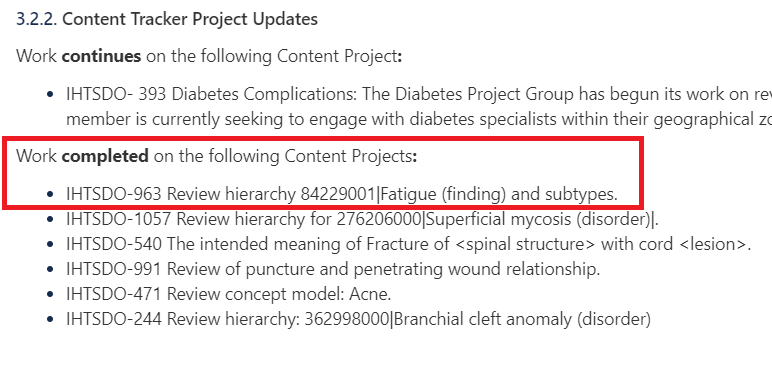
---------------------------------------
For the July 2019 release, SCTID: 84229001|Fatigue (finding) was added as an additional Parent (or supertype) to SCTID: 52702003 Chronic fatigue syndrome (disorder).
So SCTID: 52702003 Chronic fatigue syndrome (disorder) now has two Parents (supertypes):
118940003 Disease of nervous system (disorder) and
84229001 Fatigue (finding)
and therefore appears listed under Children under both
118940003 Disorder of nervous system (disorder) and
84229001 Fatigue (finding).
This additional Parent has already been incorporated into the latest release for the U.S., Belgium, Danish and Canadian national editions.
The UK Edition (released on 01 June 2019) has yet to incorporate this change, but will be expected to absorb the change for its next release, which is due in October to December, this year.
(SNOMED UK Edition is the mandatory terminology system for use in NHS England Primary Care and is planned to become mandatory for implementation across all NHS secondary care settings from 2020. See Note 4.)
Here is a screenshot from the SNOMED CT International Edition browser showing that CFS (and the terms listed under Synonyms to CFS) is now also listed as one of 9 hierarchical Children (subtypes) under Parent: Fatigue:
https://browser.ihtsdotools.org/?pe...edition=MAIN/2019-07-31&release=&languages=en
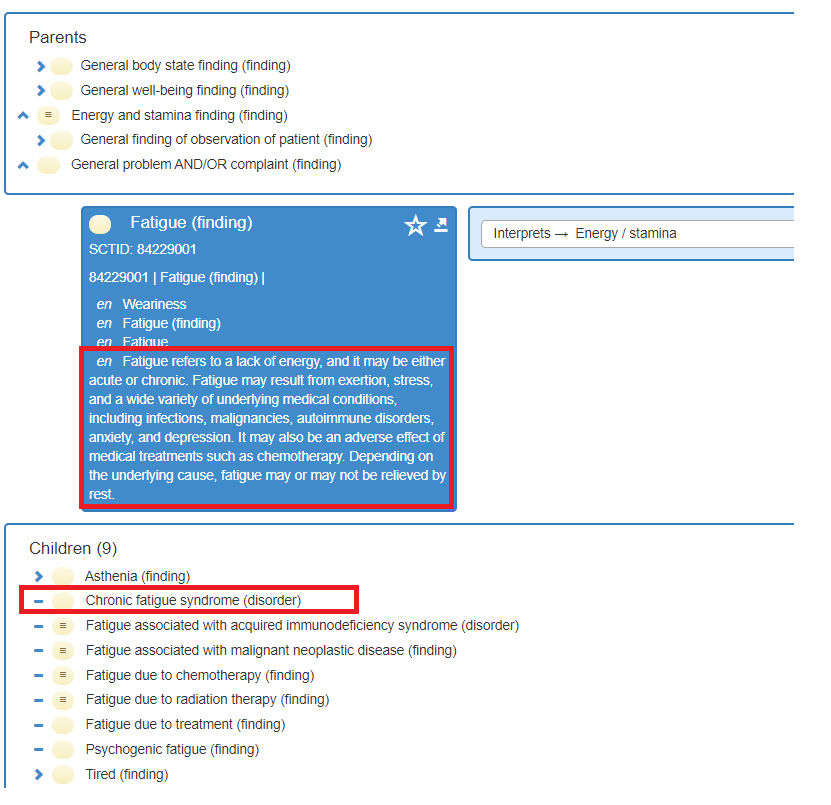
------------------------------------------------
Here is the Diagram view from the SNOMED CT International Edition browser release for July 2019 showing the revised hierarchical relationship between CFS and its Synonyms terms, and its two Parents (supertypes): Disorder of nervous system (disorder); and Fatigue (finding):
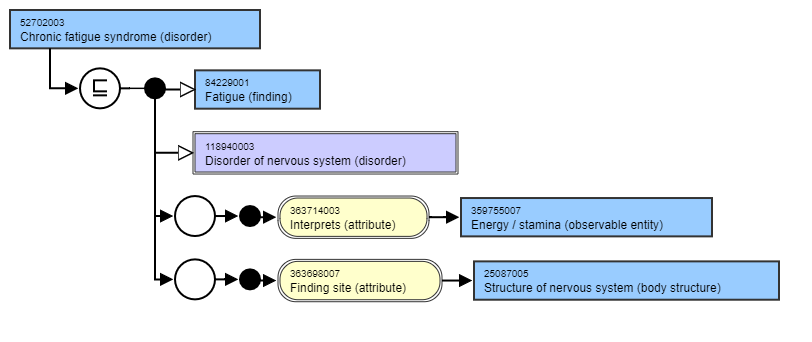
---------------------------------------
This is from the International Edition release for July 2019, showing the addition of Parent: Fatigue:
https://browser.ihtsdotools.org/?pe...edition=MAIN/2019-07-31&release=&languages=en
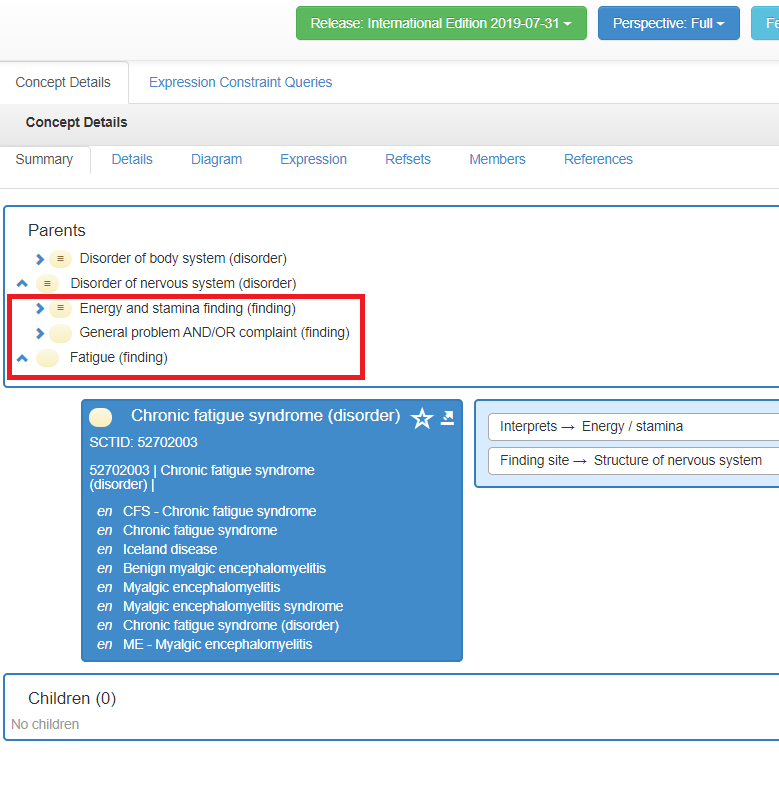
This is the same entry but without the Parent arrows opened:
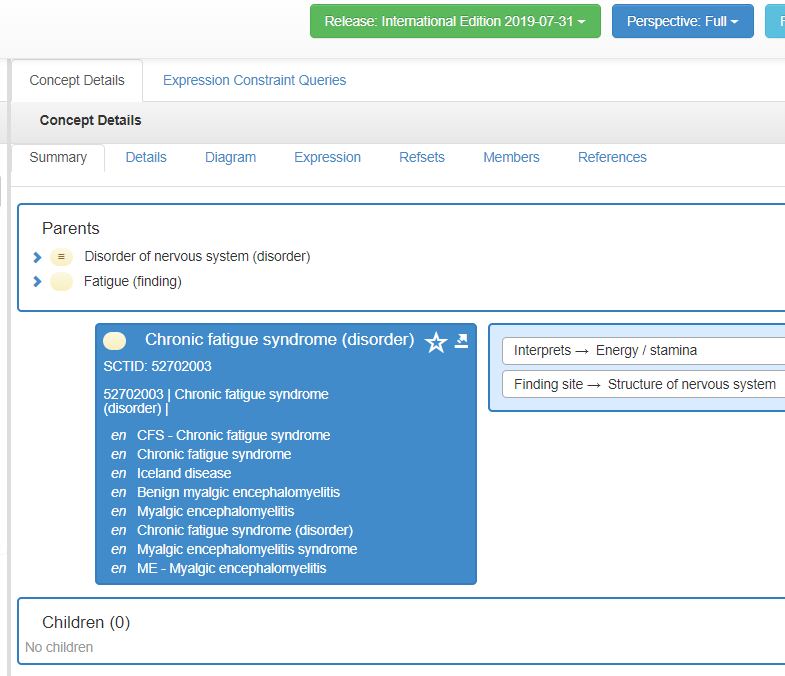
Here is the U.S. Edition (release: 1 September 2019):
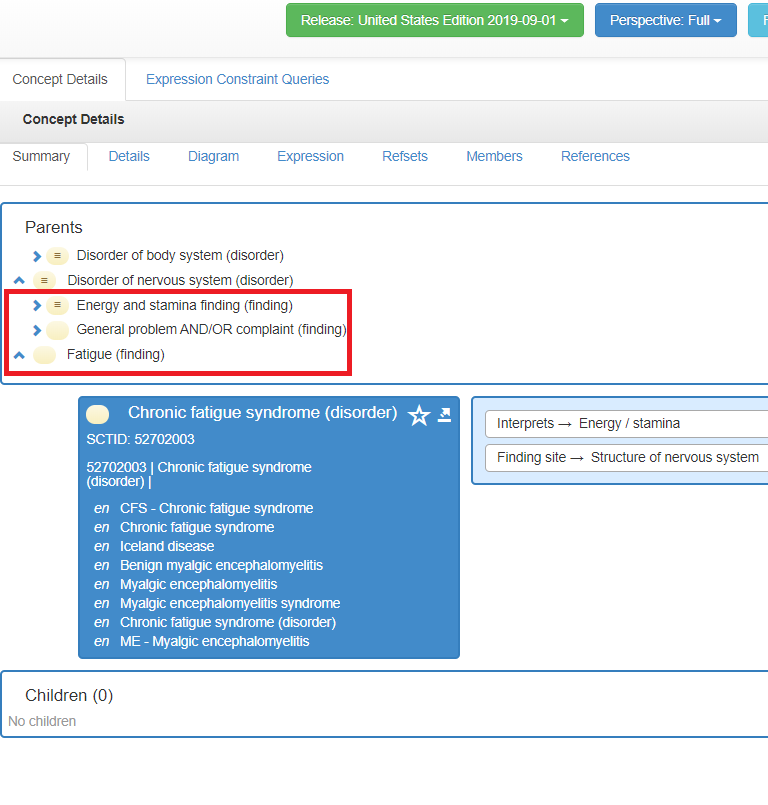
and the Canadian Edition (which was released yesterday):
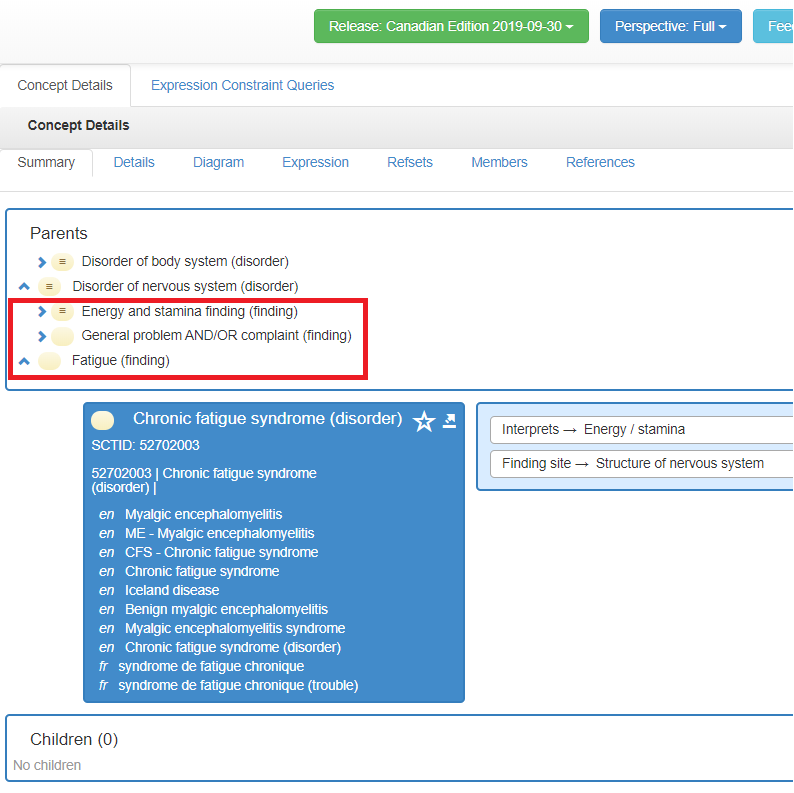
The Belgium Edition is here: https://browser.ihtsdotools.org/?pe...DCT-BE/2019-09-15&release=&languages=en,nl,fr
The Danish Edition is here: https://browser.ihtsdotools.org/?pe...OMEDCT-DK/2019-09-30&release=&languages=da,en
I cannot confirm whether the SNOMED terminology Content Project group that had been reviewing the hierarchy of "84229001|Fatigue (finding) and subtypes" had sought external input when reviewing this Concept term. This will need to be established, also the rationale and what materials/evidence were relied on when making the decision to add 84229001 Fatigue (finding) as a Parent (supertype) to SCTID: 52702003 Chronic fatigue syndrome (disorder) and its Synonyms terms.
As I am now retired, I shall be taking no advocacy action in regard to this development, myself.
Given the Countess of Mar's actions against me in April, last year, I am unable to advise Forward-ME on how they might proceed, but it is incumbent upon me to bring this development to the attention of Forward-ME's Chair and Vice-Chair and I have done so, today, via the Forward-ME secretariat.
Notes:
Note 1:
For the International Edition, the Belgium Edition, the Danish Edition and the Canadian Edition, the SNOMED CT Concept: SCTID: 52702003 Chronic fatigue syndrome (disorder) and the terms listed under Synonyms to SCTID: 52702003 continue to map to WHO's ICD-10 G93.3 and to ICD-11 8E49.
For the U.S. Edition, SNOMED CT Concept: SCTID: 52702003 Chronic fatigue syndrome (disorder) continues to map to a choice of selecting for either ICD-10-CM R53.82 or for ICD-10-CM G93.3.
Note 2:
SNOMED CT Concept SCTID: 84229001 Fatigue (finding) is mapped to WHO's ICD-10 R53 Malaise and fatigue.
Note 3:
For ICD-10, G93.3 is excluded from R53 Malaise and fatigue.
For ICD-11, 8E49 is excluded from MG22 Fatigue.
Note 4:
https://digital.nhs.uk/services/terminology-and-classifications/snomed-ct#implementation-plan
In England: SNOMED CT must be implemented across primary care and will be deployed to GP practices in a phased approach from April 2018. Systems used by GP service providers must adopt SNOMED CT. SNOMED CT must be used in place of Read Codes.
Secondary care, acute care, mental health, community systems, dentistry and other systems used in direct patient care must use SNOMED CT as the clinical terminology, before 1 April 2020.
https://hscic.kahootz.com/connect.ti/t_c_home/view?objectId=14224752
SNOMED CT, ICD and OPCS-4 are nationally required standards that serve different but related and complementary purposes. In simple terms, SNOMED CT enables the detailed recording of information to support the provision of care, whereas ICD and OPCS-4 enable the statistically valid counting of diseases, other health conditions, interventions and procedures to support epidemiology and health care management.
Presentation: NHS Digital: Clinical Coding for non coders – Overview of clinical coding, how ICD-10 and SNOMED CT work together, and the role of the Clinical Classifications Service.
[Edited for clarity and to insert additional text and associated links.]
As some of you will be aware, I am now retired from active advocacy work around coding, classification and terminology systems.
I am very concerned that no UK or international group or organization appears to have been monitoring SNOMED CT for changes to the terminology system for Concept SCTID: 52702003 Chronic fatigue syndrome (disorder) since the successful submission, in February 2018, for the addition of Parent SCTID: 118940003 Disorder of nervous system (disorder). This approved change had been implemented for the July 2018 release and subsequently incorporated into the various national editions.
(See my August 2018 statement: Statement on SNOMED CT and Chronic fatigue syndrome for the background to this submission.)
Addition of a further Parent for SCTID: 52702003 Chronic fatigue syndrome (disorder):
I have established, today, that there has been a recent change for SCTID: 52702003 Chronic fatigue syndrome (disorder) and the terms listed under Synonyms to SCTID: 52702003, for which the International Edition includes:
https://browser.ihtsdotools.org/?pe...edition=MAIN/2019-07-31&release=&languages=en
CFS - Chronic fatigue syndrome
en Chronic fatigue syndrome
en Iceland disease
en Benign myalgic encephalomyelitis
en Myalgic encephalomyelitis
en Chronic fatigue syndrome (disorder)
en Myalgic encephalomyelitis syndrome
en ME - Myalgic encephalomyelitis
en Chronic fatigue syndrome
en Iceland disease
en Benign myalgic encephalomyelitis
en Myalgic encephalomyelitis
en Chronic fatigue syndrome (disorder)
en Myalgic encephalomyelitis syndrome
en ME - Myalgic encephalomyelitis
According to the Release Notes for the International Edition's July 2019 release, SNOMED terminology managers had completed a number of content reviews, including: Review hierarchy 84229001|Fatigue (finding) and subtypes.
Below is the reference to this hierarchy review, extracted from the Release Notes:
SNOMED CT July 2019 International Edition - SNOMED International Release notes
https://confluence.ihtsdotools.org/...+Edition+-+SNOMED+International+Release+notes
3.2.2: https://confluence.ihtsdotools.org/...onalReleasenotes-ContentTrackerProjectUpdates
(...)

---------------------------------------
For the July 2019 release, SCTID: 84229001|Fatigue (finding) was added as an additional Parent (or supertype) to SCTID: 52702003 Chronic fatigue syndrome (disorder).
So SCTID: 52702003 Chronic fatigue syndrome (disorder) now has two Parents (supertypes):
118940003 Disease of nervous system (disorder) and
84229001 Fatigue (finding)
and therefore appears listed under Children under both
118940003 Disorder of nervous system (disorder) and
84229001 Fatigue (finding).
This additional Parent has already been incorporated into the latest release for the U.S., Belgium, Danish and Canadian national editions.
The UK Edition (released on 01 June 2019) has yet to incorporate this change, but will be expected to absorb the change for its next release, which is due in October to December, this year.
(SNOMED UK Edition is the mandatory terminology system for use in NHS England Primary Care and is planned to become mandatory for implementation across all NHS secondary care settings from 2020. See Note 4.)
Here is a screenshot from the SNOMED CT International Edition browser showing that CFS (and the terms listed under Synonyms to CFS) is now also listed as one of 9 hierarchical Children (subtypes) under Parent: Fatigue:
https://browser.ihtsdotools.org/?pe...edition=MAIN/2019-07-31&release=&languages=en

------------------------------------------------
Here is the Diagram view from the SNOMED CT International Edition browser release for July 2019 showing the revised hierarchical relationship between CFS and its Synonyms terms, and its two Parents (supertypes): Disorder of nervous system (disorder); and Fatigue (finding):

---------------------------------------
This is from the International Edition release for July 2019, showing the addition of Parent: Fatigue:
https://browser.ihtsdotools.org/?pe...edition=MAIN/2019-07-31&release=&languages=en

This is the same entry but without the Parent arrows opened:

Here is the U.S. Edition (release: 1 September 2019):

and the Canadian Edition (which was released yesterday):

The Belgium Edition is here: https://browser.ihtsdotools.org/?pe...DCT-BE/2019-09-15&release=&languages=en,nl,fr
The Danish Edition is here: https://browser.ihtsdotools.org/?pe...OMEDCT-DK/2019-09-30&release=&languages=da,en
I cannot confirm whether the SNOMED terminology Content Project group that had been reviewing the hierarchy of "84229001|Fatigue (finding) and subtypes" had sought external input when reviewing this Concept term. This will need to be established, also the rationale and what materials/evidence were relied on when making the decision to add 84229001 Fatigue (finding) as a Parent (supertype) to SCTID: 52702003 Chronic fatigue syndrome (disorder) and its Synonyms terms.
As I am now retired, I shall be taking no advocacy action in regard to this development, myself.
Given the Countess of Mar's actions against me in April, last year, I am unable to advise Forward-ME on how they might proceed, but it is incumbent upon me to bring this development to the attention of Forward-ME's Chair and Vice-Chair and I have done so, today, via the Forward-ME secretariat.
Notes:
Note 1:
For the International Edition, the Belgium Edition, the Danish Edition and the Canadian Edition, the SNOMED CT Concept: SCTID: 52702003 Chronic fatigue syndrome (disorder) and the terms listed under Synonyms to SCTID: 52702003 continue to map to WHO's ICD-10 G93.3 and to ICD-11 8E49.
For the U.S. Edition, SNOMED CT Concept: SCTID: 52702003 Chronic fatigue syndrome (disorder) continues to map to a choice of selecting for either ICD-10-CM R53.82 or for ICD-10-CM G93.3.
Note 2:
SNOMED CT Concept SCTID: 84229001 Fatigue (finding) is mapped to WHO's ICD-10 R53 Malaise and fatigue.
Note 3:
For ICD-10, G93.3 is excluded from R53 Malaise and fatigue.
For ICD-11, 8E49 is excluded from MG22 Fatigue.
Note 4:
https://digital.nhs.uk/services/terminology-and-classifications/snomed-ct#implementation-plan
In England: SNOMED CT must be implemented across primary care and will be deployed to GP practices in a phased approach from April 2018. Systems used by GP service providers must adopt SNOMED CT. SNOMED CT must be used in place of Read Codes.
Secondary care, acute care, mental health, community systems, dentistry and other systems used in direct patient care must use SNOMED CT as the clinical terminology, before 1 April 2020.
https://hscic.kahootz.com/connect.ti/t_c_home/view?objectId=14224752
SNOMED CT, ICD and OPCS-4 are nationally required standards that serve different but related and complementary purposes. In simple terms, SNOMED CT enables the detailed recording of information to support the provision of care, whereas ICD and OPCS-4 enable the statistically valid counting of diseases, other health conditions, interventions and procedures to support epidemiology and health care management.
Presentation: NHS Digital: Clinical Coding for non coders – Overview of clinical coding, how ICD-10 and SNOMED CT work together, and the role of the Clinical Classifications Service.
[Edited for clarity and to insert additional text and associated links.]
Last edited:
Thank you @Dx Revision Watch. Can you put into a few simple words for people like me who don't understand all the terminology what this means for patients?
Dx Revision Watch
Senior Member (Voting Rights)
Thank you @Dx Revision Watch. Can you put into a few simple words for people like me who don't understand all the terminology what this means for patients?
No, sorry, I am retired now.
Fair enough!No, sorry, I am retired now.
NelliePledge
Senior Member (Voting Rights)
Maybe something I would have been able to contribute to when I was healthy but I just can’t concentrate well enough to begin to get my head round the material.
Dx Revision Watch
Senior Member (Voting Rights)
(As posted on Twitter today.)
Although links for releases of ICD-10 Volume 1: Tabular List in html format are available online at: https://who.int/classifications/icd/icdonlineversions/en/
ICD-10 2016 (Current version)
ICD-10 2015
ICD-10 2014 version
ICD-10 2010 version
ICD-10 2008 version
ICD-10 2007 version
ICD-10 2006 version
ICD-10 2005 version
ICD-10 2004 version
ICD-10 2003 version (Second Edition)
and via the ICD-10 browser at: https://icd.who.int/browse10/2016/en#/
historically, PDF versions of the ICD-10 Volume 1: Tabular List and Volume 3: Alphabetical Index have not been available without a license.
PDF versions of ICD-10 Volume 1: Tabular List; Volume 2: Instruction Manual and Volume 3: Alphabetical Index are now available to download from the WHO IRIS Repository at: https://apps.who.int/iris/
The following versions of ICD-10 are free to download as PDFs from this page: https://apps.who.int/iris/handle/10665/246208
(5th Edition, 2016 © World Health Organization 2011, Reprinted in 2015)
9789241549165-V1 (English, Volume 1) 9.952Mb
9789241549165-V2 (English, Volume 2) 2.370Mb
9789241549165-V3 (English, Volume 3) 3.110Mb
(Svensk version 2016)
9789175553801 (Swedish, V1, part 1)
9789175553818 (Swedish, V1, part 2)
9789175553825 (Swedish, V1, part 3)
(obsahová aktualizace k 1. 1. 2018)
9788074721687 (Czech, Volume 1)
9788074721694 (Czech, Volume 2)
9788074721700 (Czech, Volume 3)
(Quinta edizione 2016)
9788894307603; 9788894307610 (Italian, Volume 1)
9788894307603; 9788894307627 (Italian, Volume 2)
9788894307603; 9788894307634 (Italian, Volume 3)
----------
ICD-9
The basic tabulation list with alphabetic index is archived as a facsimile PDF here: https://apps.who.int/iris/handle/10665/39473
-----------
A release for 2019 (which the WHO has said will be the final version of ICD-10 to be released) has already been prepared for licence holders but is not yet publicly available from the WHO website or ICD-10 browser.
Although links for releases of ICD-10 Volume 1: Tabular List in html format are available online at: https://who.int/classifications/icd/icdonlineversions/en/
ICD-10 2016 (Current version)
ICD-10 2015
ICD-10 2014 version
ICD-10 2010 version
ICD-10 2008 version
ICD-10 2007 version
ICD-10 2006 version
ICD-10 2005 version
ICD-10 2004 version
ICD-10 2003 version (Second Edition)
and via the ICD-10 browser at: https://icd.who.int/browse10/2016/en#/
historically, PDF versions of the ICD-10 Volume 1: Tabular List and Volume 3: Alphabetical Index have not been available without a license.
PDF versions of ICD-10 Volume 1: Tabular List; Volume 2: Instruction Manual and Volume 3: Alphabetical Index are now available to download from the WHO IRIS Repository at: https://apps.who.int/iris/
The following versions of ICD-10 are free to download as PDFs from this page: https://apps.who.int/iris/handle/10665/246208
(5th Edition, 2016 © World Health Organization 2011, Reprinted in 2015)
9789241549165-V1 (English, Volume 1) 9.952Mb
9789241549165-V2 (English, Volume 2) 2.370Mb
9789241549165-V3 (English, Volume 3) 3.110Mb
(Svensk version 2016)
9789175553801 (Swedish, V1, part 1)
9789175553818 (Swedish, V1, part 2)
9789175553825 (Swedish, V1, part 3)
(obsahová aktualizace k 1. 1. 2018)
9788074721687 (Czech, Volume 1)
9788074721694 (Czech, Volume 2)
9788074721700 (Czech, Volume 3)
(Quinta edizione 2016)
9788894307603; 9788894307610 (Italian, Volume 1)
9788894307603; 9788894307627 (Italian, Volume 2)
9788894307603; 9788894307634 (Italian, Volume 3)
----------
ICD-9
The basic tabulation list with alphabetic index is archived as a facsimile PDF here: https://apps.who.int/iris/handle/10665/39473
-----------
A release for 2019 (which the WHO has said will be the final version of ICD-10 to be released) has already been prepared for licence holders but is not yet publicly available from the WHO website or ICD-10 browser.
Last edited:
Dx Revision Watch
Senior Member (Voting Rights)
Status of the publication of the ICD-11 CDDG:
For ICD-11, the WHO Department of Mental Health and Substance Abuse has developed the “Clinical Descriptions and Diagnostic Guidelines (CDDG) for ICD‐11 Mental, Behavioural and Neurodevelopmental Disorders” (an equivalent publication to ICD-10’s “Blue Book”) in collaboration with the Global Clinical Practice Network.
The CDDG provides expanded clinical descriptions, essential (required) features, boundaries with other disorders and normality, differential diagnoses, additional features, culture-related features and codes for all mental and behavioural disorders commonly encountered in clinical psychiatry; it is intended for mental health professionals and for general clinical, educational and service use.
WHO has said it plans to release the CDDG “as soon as possible” after WHA’s adoption of ICD-11 (which was adopted at the May 2019 World Health Assembly, with WHA's endorsement to take effect on January 1, 2022).
I have it on good authority that field trials or evaluation of field trials for some disorder categories in the CDDG are yet to be completed and that it is likely now that the CDDG won't be released this year.
Status of development of the ICD-11 PHC:
Also under development is the WHO’s ICD-11 PHC — a clinical guideline written in simpler language to assist non-mental health specialists, especially primary care practitioners and non medically trained health workers, and also intended for use in low resource settings and low- to middle-income countries, with the diagnosis and management of common mental disorders. It comprises 27 mental disorders and contains no other disorders or diseases. Like the ICD-10 PHC (1996), this revised diagnostic and management guideline will not be a mandatory classification for member states.
There is no information on when the WHO/Department of Mental Health and Substance Abuse expects to complete and release this guideline or whether it is also delayed because field trials or field trial evaluations are still ongoing.
For ICD-11, the WHO Department of Mental Health and Substance Abuse has developed the “Clinical Descriptions and Diagnostic Guidelines (CDDG) for ICD‐11 Mental, Behavioural and Neurodevelopmental Disorders” (an equivalent publication to ICD-10’s “Blue Book”) in collaboration with the Global Clinical Practice Network.
The CDDG provides expanded clinical descriptions, essential (required) features, boundaries with other disorders and normality, differential diagnoses, additional features, culture-related features and codes for all mental and behavioural disorders commonly encountered in clinical psychiatry; it is intended for mental health professionals and for general clinical, educational and service use.
WHO has said it plans to release the CDDG “as soon as possible” after WHA’s adoption of ICD-11 (which was adopted at the May 2019 World Health Assembly, with WHA's endorsement to take effect on January 1, 2022).
I have it on good authority that field trials or evaluation of field trials for some disorder categories in the CDDG are yet to be completed and that it is likely now that the CDDG won't be released this year.
Status of development of the ICD-11 PHC:
Also under development is the WHO’s ICD-11 PHC — a clinical guideline written in simpler language to assist non-mental health specialists, especially primary care practitioners and non medically trained health workers, and also intended for use in low resource settings and low- to middle-income countries, with the diagnosis and management of common mental disorders. It comprises 27 mental disorders and contains no other disorders or diseases. Like the ICD-10 PHC (1996), this revised diagnostic and management guideline will not be a mandatory classification for member states.
There is no information on when the WHO/Department of Mental Health and Substance Abuse expects to complete and release this guideline or whether it is also delayed because field trials or field trial evaluations are still ongoing.
Last edited:
Dx Revision Watch
Senior Member (Voting Rights)
[Also edited into Post #306]
U.S. evaluation and preparation for adoption of ICD-11 for mortality usage and potential adaptation of ICD-11 for a clinical modification for morbidity usage:
A summary of the August 6-7, 2019 NCVHS ICD-11 Roundtable Meeting has now been posted on the Expert Roundtable Meeting documents page: https://ncvhs.hhs.gov/meetings/subc...-icd-11-evaluation-expert-roundtable-meeting/
This document is a preliminary summary and there are two Appendices (Appendix E: Final Research Questions and Appendix F: ICD-11 Communications Plan) plus additional links to be inserted when these Appendices have been finalized.
Preliminary Summary: International Classification of Diseases, Eleventh Revision (ICD-11) Expert Roundtable Meeting (August 6-7, 2019):
Publication Date: October 10, 2019
PDF: Preliminary Meeting Summary
https://ncvhs.hhs.gov/wp-content/up...ds-Subcommittee-ICD-11-Meeting-10-10-2019.pdf
Extract:
Key points for planned Letter to Secretary, HHS:

Appendix E: Final Research Questions [Will be inserted by Expert Roundtable group when final]
Appendix F: ICD-11 Communications Plan [Will be inserted by Expert Roundtable group when final]
U.S. evaluation and preparation for adoption of ICD-11 for mortality usage and potential adaptation of ICD-11 for a clinical modification for morbidity usage:
A summary of the August 6-7, 2019 NCVHS ICD-11 Roundtable Meeting has now been posted on the Expert Roundtable Meeting documents page: https://ncvhs.hhs.gov/meetings/subc...-icd-11-evaluation-expert-roundtable-meeting/
This document is a preliminary summary and there are two Appendices (Appendix E: Final Research Questions and Appendix F: ICD-11 Communications Plan) plus additional links to be inserted when these Appendices have been finalized.
Preliminary Summary: International Classification of Diseases, Eleventh Revision (ICD-11) Expert Roundtable Meeting (August 6-7, 2019):
Publication Date: October 10, 2019
PDF: Preliminary Meeting Summary
https://ncvhs.hhs.gov/wp-content/up...ds-Subcommittee-ICD-11-Meeting-10-10-2019.pdf
Extract:
Key points for planned Letter to Secretary, HHS:

Appendix E: Final Research Questions [Will be inserted by Expert Roundtable group when final]
Appendix F: ICD-11 Communications Plan [Will be inserted by Expert Roundtable group when final]
Last edited:
Dx Revision Watch
Senior Member (Voting Rights)
[U.S.] The next Full Committee Meeting of the National Committee on Vital and Health Statistics (NCVHS) is scheduled for November 13-14, 2019:
Meeting page and html Tentative Agenda: https://ncvhs.hhs.gov/meetings/full-committee-meeting-2/
PDF Tentative Agenda: https://ncvhs.hhs.gov/wp-content/uploads/2019/10/Agenda-Full-Committee-Meeting-November-13-14-2019.pdf
National Committee on Vital and Health Statistics
Full Committee Meeting
November 13-14, 2019
Cohen Building, Snow Room, Fifth Floor
330 Independence Avenue, SW
Washington, D.C. 20024
Call-In Information
No pre-registration required. Live broadcast is open to the public.
Meeting ID: 255 000 713
Password: Nov2019
Join Zoom Meeting Via Computer: https://zoom.us/j/255000713?pwd=SkRTb2Nna2xVMGNFM0lzejZpRkp1dz09
Join Zoom Meeting Via Phone:
+1 929 205 6099 US (New York)
+1 669 900 6833 US (San Jose)
888 475 4499 US Toll-free
877 853 5257 US Toll-free
Meeting ID: 255 000 713
Find your local number: https://zoom.us/u/afo2gLUlV
One tap mobile
+19292056099,,255000713# US (New York)
+16699006833,,255000713# US (San Jose)
Extract, Meeting Day One: Wednesday, November 13, 2019:
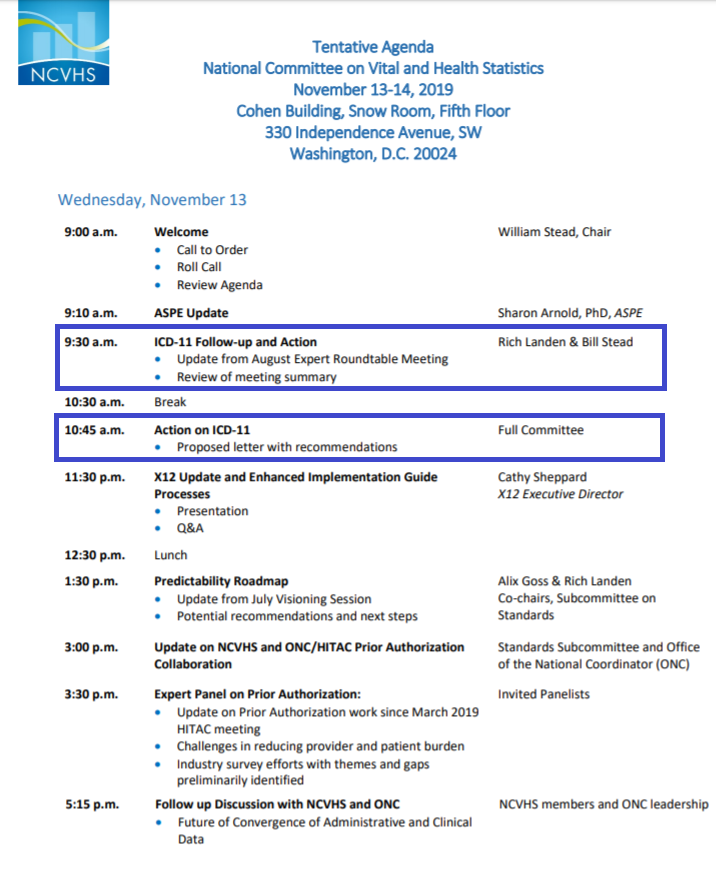
If a draft letter to the Secretary, HHS or a copy of the finalized letter is released following this meeting, I will post a copy here.
Meeting page and html Tentative Agenda: https://ncvhs.hhs.gov/meetings/full-committee-meeting-2/
PDF Tentative Agenda: https://ncvhs.hhs.gov/wp-content/uploads/2019/10/Agenda-Full-Committee-Meeting-November-13-14-2019.pdf
National Committee on Vital and Health Statistics
Full Committee Meeting
November 13-14, 2019
Cohen Building, Snow Room, Fifth Floor
330 Independence Avenue, SW
Washington, D.C. 20024
Call-In Information
No pre-registration required. Live broadcast is open to the public.
Meeting ID: 255 000 713
Password: Nov2019
Join Zoom Meeting Via Computer: https://zoom.us/j/255000713?pwd=SkRTb2Nna2xVMGNFM0lzejZpRkp1dz09
Join Zoom Meeting Via Phone:
+1 929 205 6099 US (New York)
+1 669 900 6833 US (San Jose)
888 475 4499 US Toll-free
877 853 5257 US Toll-free
Meeting ID: 255 000 713
Find your local number: https://zoom.us/u/afo2gLUlV
One tap mobile
+19292056099,,255000713# US (New York)
+16699006833,,255000713# US (San Jose)
Extract, Meeting Day One: Wednesday, November 13, 2019:

If a draft letter to the Secretary, HHS or a copy of the finalized letter is released following this meeting, I will post a copy here.
Dx Revision Watch
Senior Member (Voting Rights)
From The ME Global Chronicle's Facebook page (Posted 04 November 2019):
12hrs
Rob Wijbenga shared a link.
Update on the classification of PVFS, ME and CFS for ICD-11
ICD-11 Report One | November 2019
In this important update on ICD-11, Suzy Chapman writes: "Please note that I have retired from active advocacy work around classifications and coding. It is crucial that advocates, patient groups and their professional allies inform themselves, become confident around the various classification and terminology systems and take responsibility, as stakeholders, for submitting timely responses and requests for changes, because I shall no longer be doing this work."
The International Classification of Diseases 10th Revision (ICD-10) is the global standard diagnostic classification of diseases for use in epidemiology, health management and clinical practice. ICD is maintained and published by the World Health Organization (WHO).
How disease terms are classified has implications for commissioning of services and may negatively influence the perceptions of researchers, clinicians, allied health professionals, medical insurers and agencies involved with benefits assessment, provision of social care, access to disability adaptations and workplace and education accommodations.
The next major revision of ICD (ICD-11) has been in development since 2007.
In June 2018, the WHO published a stable version of ICD-11 as an “advance preview” to enable Member States to start planning for implementation of the new edition.
On May 25, 2019, the World Health Assembly (WHA) voted unanimously to adopt ICD-11.
WHA’s endorsement of the new edition won’t come into effect until January 01, 2022, which is the earliest date from which Member States can begin using ICD-11 for reporting data.
There is no mandatory implementation date and Member States will migrate to ICD-11 at their own pace and according to their countries’ specific timelines, requirements and resources. During this transitional period, the WHO will accept data recorded using ICD-10 or the new ICD-11 code sets.
The progress of the G93.3 terms through the ICD-11 Alpha and Beta drafting stages has been a frustrating and tortuous journey hampered by a lack of transparency and accountability on the part of ICD Revision and an apparent indifference to maintaining effective stakeholder engagement.
How have the ICD-10 G93.3 terms been classified for ICD-11?
Download my report at:
PDF:
https://dxrevisionwatch.files.wordpress.com/2019/11/update-on-classification-of-pvfs-me-cfs-for-icd11.pdf
or
http://bit.ly/MEGCICD11
Suzy Chapman
Dx Revision Watch
https://dxrevisionwatch.com
note: this update has been written by Suzy for the ME Global Chronicle and will be included in the December 2019-issue of the magazine as well.
12hrs
Rob Wijbenga shared a link.
Update on the classification of PVFS, ME and CFS for ICD-11
ICD-11 Report One | November 2019
In this important update on ICD-11, Suzy Chapman writes: "Please note that I have retired from active advocacy work around classifications and coding. It is crucial that advocates, patient groups and their professional allies inform themselves, become confident around the various classification and terminology systems and take responsibility, as stakeholders, for submitting timely responses and requests for changes, because I shall no longer be doing this work."
The International Classification of Diseases 10th Revision (ICD-10) is the global standard diagnostic classification of diseases for use in epidemiology, health management and clinical practice. ICD is maintained and published by the World Health Organization (WHO).
How disease terms are classified has implications for commissioning of services and may negatively influence the perceptions of researchers, clinicians, allied health professionals, medical insurers and agencies involved with benefits assessment, provision of social care, access to disability adaptations and workplace and education accommodations.
The next major revision of ICD (ICD-11) has been in development since 2007.
In June 2018, the WHO published a stable version of ICD-11 as an “advance preview” to enable Member States to start planning for implementation of the new edition.
On May 25, 2019, the World Health Assembly (WHA) voted unanimously to adopt ICD-11.
WHA’s endorsement of the new edition won’t come into effect until January 01, 2022, which is the earliest date from which Member States can begin using ICD-11 for reporting data.
There is no mandatory implementation date and Member States will migrate to ICD-11 at their own pace and according to their countries’ specific timelines, requirements and resources. During this transitional period, the WHO will accept data recorded using ICD-10 or the new ICD-11 code sets.
The progress of the G93.3 terms through the ICD-11 Alpha and Beta drafting stages has been a frustrating and tortuous journey hampered by a lack of transparency and accountability on the part of ICD Revision and an apparent indifference to maintaining effective stakeholder engagement.
How have the ICD-10 G93.3 terms been classified for ICD-11?
Download my report at:
PDF:
https://dxrevisionwatch.files.wordpress.com/2019/11/update-on-classification-of-pvfs-me-cfs-for-icd11.pdf
or
http://bit.ly/MEGCICD11
Suzy Chapman
Dx Revision Watch
https://dxrevisionwatch.com
note: this update has been written by Suzy for the ME Global Chronicle and will be included in the December 2019-issue of the magazine as well.
Attachments
Last edited:
Dx Revision Watch
Senior Member (Voting Rights)
U.S. coding industry company, ICD10monitor, and Talk Ten Tuesdays have launched a new series, which will continue through November, focusing on the need for the coding industry's early preparation for the new ICD-11 code set.
On November 5, the WHO's Dr Robert Jakob participated in an ICD10Monitor "Talk Ten Tuesdays" broadcast, hosted by Chuck Buck:
01 January 2022 is the earliest date from which the World Health Organization can begin accepting data recorded using the new ICD-11 code sets.
According to Dr Jakob's contribution to Tuesday's podcast, Japan has already completed translation of ICD-11, is expected to be one of the earliest implementers and could be ready to roll out ICD-11 within three years.
--------------------------------
Although the U.S. did not implement its clinical modification of ICD-10 (ICD-10-CM) for morbidity use until October 2015, the use of ICD-10 for U.S. mortality records was in implemented in 1999.
Unlike the U.S. clinical modification, no rule making is required for implementation of ICD editions for mortality use.
The National Committee on Vital and Health Statistics Subcommittee on Standards (NCVHS) ICD-11 Expert Roundtable Meeting, held on August 6-7, 2019, projected the earliest date for implementation of ICD-11 for mortality records is 2023-25.
The NCVHS ICD-11 Expert Roundtable Committee is in the process of drafting a letter to the Secretary, HHS, which is expected to include among its Key Points that NCVHS recommends urgently conducting research to inform the path forward for accelerating adoption and implementation of ICD-11 for mortality use in the United States [1].
1 Preliminary Meeting Summary: International Classification of Diseases, Eleventh Revision (ICD-11) Expert Roundtable Preliminary Meeting Summary Held August 6-7, 2019 Subcommittee on Standards National Committee on Vital and Health Statistics (NCVHS) https://ncvhs.hhs.gov/wp-content/up...ds-Subcommittee-ICD-11-Meeting-10-10-2019.pdf
Around 25 member states were licensed by the WHO to modify ICD-10 for country specific use for morbidity records. The WHO is still formulating policies around the licensing of ICD-11 for the development of national modifications for morbidity use.
U.S. advocates and patient groups will need to keep a close eye on National Committee on Vital and Health Statistics Subcommittee on Standards (NCVHS) meetings and letters to the Secretary, HHS.
The NCVHS meeting page is here: https://ncvhs.hhs.gov/meetings-meeting/
The next Full Committee Meeting is scheduled for November 13-14, 2019: https://ncvhs.hhs.gov/meetings/full-committee-meeting-2/
The Tentative Agenda is here: https://ncvhs.hhs.gov/wp-content/up...ull-Committee-Meeting-November-13-14-2019.pdf
An update on the work of the NCVHS ICD-11 Expert Roundtable Committee is tabled for Meeting Day One:
Extract from Agenda Day One (Wednesday, November 13):
9:30 a.m. ICD-11 Follow-up and Action Rich Landen & Bill Stead
These are public meetings and agendas, recordings, full transcripts, meeting summaries and meeting materials are publicly posted on the NCVHS Meetings pages.
------------------------
Note: Since its initial launch, in 2007, the U.S. has maintained high level participation in the ICD-11 development process and its ongoing update and improvement:
The U.S. provided representatives from professional and scientific organisations, academics and practitioners for the ICD-11 Topic Advisory Groups (TAGs) and sub working groups. Stanford Center for Biomedical Informatics Research developed the web based iCAT Collaborative Authoring Platform on which ICD-11 was developed.
The U.S. has representatives on the ICD-11 governance committees via the WHO-FIC Network; the Medical Scientific Advisory Committee (MSAC); the Classifications and Statistics Advisory Committee (CSAC); the Mortality and Morbidity (MbRF) Reference Groups; and the Functioning and Disability Reference Group, which have oversight for the annual updating and ongoing improvement of the global ICD-11 edition.
Dr Geoffrey Reed (WHO, Geneva; Columbia University) is Senior Project Lead for the ICD-11 Mental Health chapter and a member of the MSAC; Steven Hyman, MD (former Director of the National Institute of Mental Health (NIMH) and former DSM-5 Task Force member) chaired the Topic Advisory Group for Mental Health; Michael B First, MD has served as a key external advisor to the Mental Health chapter. Harold Pincus, MD co-chaired the ICD-11 Quality and Patient Safety Topic Advisory Group.
Dr Christopher Chute (John Hopkins University) chaired the ICD-11 Revision Steering Committee, was a member of the Joint Task Force and now co-chairs the MSAC; Donna Pickett (Chief, Classifications and Public Health Data Standards, NCHS, Centers for Disease Control and Prevention, Head, Collaborating Center for the WHO-FIC in North America) co-chaired the Morbidity TAG, was a member of the Joint Task Force and is a member of the CSAC; Dr Robert Anderson (Chief, Mortality Statistics Branch Division of Vital Statistics, Centers for Disease Control and Prevention) was a member of the Joint Task Force and co-chaired the Mortality TAG; Cille Kennedy (ASPE) co-chaired the ICD-11 Functioning TAG; Sue Bowman (Senior Director of Coding Policy and Compliance, AHIMA) is a representative on the ICD-11 Morbidity Reference Group (MbRF).
On November 5, the WHO's Dr Robert Jakob participated in an ICD10Monitor "Talk Ten Tuesdays" broadcast, hosted by Chuck Buck:
https://www.icd10monitor.com/talk-ten-tuesdays-podcasts
Ten Going on Eleven: The Train Has Left the Station
November 05, 2019
Podcast with Chuck Buck | Timothy Powell, CPA | Laurie M. Johnson | Melanie Endicott | Margaret A. Skurka | Robert Jakob, MD | Erica Remer, MD
Ten Going on Eleven: The Train Has Left the Station
November 05, 2019
Podcast with Chuck Buck | Timothy Powell, CPA | Laurie M. Johnson | Melanie Endicott | Margaret A. Skurka | Robert Jakob, MD | Erica Remer, MD
01 January 2022 is the earliest date from which the World Health Organization can begin accepting data recorded using the new ICD-11 code sets.
According to Dr Jakob's contribution to Tuesday's podcast, Japan has already completed translation of ICD-11, is expected to be one of the earliest implementers and could be ready to roll out ICD-11 within three years.
--------------------------------
Although the U.S. did not implement its clinical modification of ICD-10 (ICD-10-CM) for morbidity use until October 2015, the use of ICD-10 for U.S. mortality records was in implemented in 1999.
Unlike the U.S. clinical modification, no rule making is required for implementation of ICD editions for mortality use.
The National Committee on Vital and Health Statistics Subcommittee on Standards (NCVHS) ICD-11 Expert Roundtable Meeting, held on August 6-7, 2019, projected the earliest date for implementation of ICD-11 for mortality records is 2023-25.
The NCVHS ICD-11 Expert Roundtable Committee is in the process of drafting a letter to the Secretary, HHS, which is expected to include among its Key Points that NCVHS recommends urgently conducting research to inform the path forward for accelerating adoption and implementation of ICD-11 for mortality use in the United States [1].
1 Preliminary Meeting Summary: International Classification of Diseases, Eleventh Revision (ICD-11) Expert Roundtable Preliminary Meeting Summary Held August 6-7, 2019 Subcommittee on Standards National Committee on Vital and Health Statistics (NCVHS) https://ncvhs.hhs.gov/wp-content/up...ds-Subcommittee-ICD-11-Meeting-10-10-2019.pdf
Around 25 member states were licensed by the WHO to modify ICD-10 for country specific use for morbidity records. The WHO is still formulating policies around the licensing of ICD-11 for the development of national modifications for morbidity use.
U.S. advocates and patient groups will need to keep a close eye on National Committee on Vital and Health Statistics Subcommittee on Standards (NCVHS) meetings and letters to the Secretary, HHS.
The NCVHS meeting page is here: https://ncvhs.hhs.gov/meetings-meeting/
The next Full Committee Meeting is scheduled for November 13-14, 2019: https://ncvhs.hhs.gov/meetings/full-committee-meeting-2/
The Tentative Agenda is here: https://ncvhs.hhs.gov/wp-content/up...ull-Committee-Meeting-November-13-14-2019.pdf
An update on the work of the NCVHS ICD-11 Expert Roundtable Committee is tabled for Meeting Day One:
Extract from Agenda Day One (Wednesday, November 13):
9:30 a.m. ICD-11 Follow-up and Action Rich Landen & Bill Stead
- Update from August Expert Roundtable Meeting
- Review of meeting summary
- Letter with recommendations to the Secretary and attachments
These are public meetings and agendas, recordings, full transcripts, meeting summaries and meeting materials are publicly posted on the NCVHS Meetings pages.
------------------------
Note: Since its initial launch, in 2007, the U.S. has maintained high level participation in the ICD-11 development process and its ongoing update and improvement:
The U.S. provided representatives from professional and scientific organisations, academics and practitioners for the ICD-11 Topic Advisory Groups (TAGs) and sub working groups. Stanford Center for Biomedical Informatics Research developed the web based iCAT Collaborative Authoring Platform on which ICD-11 was developed.
The U.S. has representatives on the ICD-11 governance committees via the WHO-FIC Network; the Medical Scientific Advisory Committee (MSAC); the Classifications and Statistics Advisory Committee (CSAC); the Mortality and Morbidity (MbRF) Reference Groups; and the Functioning and Disability Reference Group, which have oversight for the annual updating and ongoing improvement of the global ICD-11 edition.
Dr Geoffrey Reed (WHO, Geneva; Columbia University) is Senior Project Lead for the ICD-11 Mental Health chapter and a member of the MSAC; Steven Hyman, MD (former Director of the National Institute of Mental Health (NIMH) and former DSM-5 Task Force member) chaired the Topic Advisory Group for Mental Health; Michael B First, MD has served as a key external advisor to the Mental Health chapter. Harold Pincus, MD co-chaired the ICD-11 Quality and Patient Safety Topic Advisory Group.
Dr Christopher Chute (John Hopkins University) chaired the ICD-11 Revision Steering Committee, was a member of the Joint Task Force and now co-chairs the MSAC; Donna Pickett (Chief, Classifications and Public Health Data Standards, NCHS, Centers for Disease Control and Prevention, Head, Collaborating Center for the WHO-FIC in North America) co-chaired the Morbidity TAG, was a member of the Joint Task Force and is a member of the CSAC; Dr Robert Anderson (Chief, Mortality Statistics Branch Division of Vital Statistics, Centers for Disease Control and Prevention) was a member of the Joint Task Force and co-chaired the Mortality TAG; Cille Kennedy (ASPE) co-chaired the ICD-11 Functioning TAG; Sue Bowman (Senior Director of Coding Policy and Compliance, AHIMA) is a representative on the ICD-11 Morbidity Reference Group (MbRF).
Last edited:
